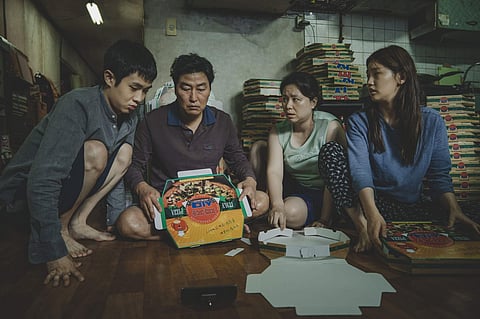Parasite Movie Review: An incisive commentary on class couched in captivating cinema
Rating:(4 / 5)
Bong Joon-ho's Parasite, the most celebrated film of last year, has finally opened in India. And all the accolades it is receiving are well-deserved indeed. The first of these was Palme d'Or at Cannes, where it premiered. The film — particularly its first act — reminded me of the Palme d'Or winner of the year before, Hirokazu Kore-eda's Shoplifters. Both films are about impoverished families employing questionable means to make a living. While in Kore-eda's film a group of unconnected people come together and posing as a family, Parasite has members of a family pretend to be unrelated in order to hoodwink their way into the employ of a wealthy family. The tones of the two films, however, are quite disparate. Kore-eda's film is all tenderness and compassion. Bong, on the other hand, gives us a darkly comic thriller.
Director: Bong Joon-ho
Producers: Kwak Sin-ae, Moon Yang-kwon, Bong Joon-ho, Jang Young-hwan
Cast: Song Kang-ho, Lee Sun-kyun, Cho Yeo-jeong, Choi Woo-shik, Park So-dam, Chang Hyae-jin
This isn't the only difference between the two. In Shoplifters, Kore-eda trains his empathetic eye at one specific group of people, while Parasite is more about society at large and the inequalities inherent in our world. This isn't to say that Bong is indifferent to his characters. Nor does he short-change them (Parasite has one of the best ensembles in recent memory, and Bong makes excellent use of them). He is just more objective, and perhaps cynical, in his view of them. But he does not blame any of them individually for their flaws, nor praise their virtues. They are all products of the system. As Chung-sook, the mother, says of the lady who employs them, "[She is] not 'rich, but still nice'. [Rather,] nice because she is rich." Money, she says, is an iron that smoothes out all the creases in rich people. "I'd be nice too if I had all this money." The truth of the statement cannot be gainsaid.
There is often a tendency in fiction to make the poor and disadvantaged out to be saints. They are shown to be more kind, especially to those below them in the social order. Ditto for women as opposed to men. Parasite breaks with convention. Kim Ki-taek, the father, is the one who spares a thought for the driver he has replaced. His daughter shuts him up fast and tells him to focus on them instead. Chung-sook, too, is not very sympathetic to the plight of the housekeeper whose place she has taken. "Don't call me sis!" she tells her, when the latter tries to appeal for kindness. Not long after, the tables turn and Chung-sook is treated to the same line. Even among the downtrodden, there's a hierarchy. You may be stomped upon but you are standing on someone's shoulder too. And when you're at the bottom and want to survive, you can't be too nice.
Should you choose to ignore the social commentary, Parasite will still prove to be a thoroughly satisfying film. Bong's screenplay is taut, original, and keeps us guessing till the very end. But it's the layers in it that make Parasite so original and the love it is receiving so reassuring. While Bong's incisive look at class conflict is centred in the local milieu of Seoul, it applies universally. He lays bare curse of capitalism and the ever-widening gap it breeds between the haves and the have-nots. A rain that completely upends the lives of the poor is counted as a blessing by the rich ("The sky's so blue and there's no pollution!").
In such a situation, aspiration to overcome one's circumstances and lack of privilege and climb higher might seem like a natural response. Particularly, to those of us already blessed with privilege — privilege to set our sights higher, if not that of being born at the top already. In Parasite, it's the son, Kim Ki-woo, who has this aspiration. Though he initially terms himself a loser, once his friend tells him he can teach 10 times better than college boys, while he hasn't even been to one, Ki-woo realises this is true. And when he prints out a forged university certificate, he assures his father he will go to that university the following year and has only printed out the document a bit early. He's also the one who starts daydreaming about living in the house of the wealthy family. His sister, Kim Ki-jeong, on the other hand, is much more pragmatic. When he asks her which room she'd want if they lived there, she shoots back, "Get me the house first. Then I'll think about it." It might seem cynical, but there's wisdom in her approach too.
The second act of Parasite ends with a brilliant sequence of the Kim family stealing away from the Park house to their own. They make their way from the wealthy neighbourhood down to the nether regions of the city where they live, quite literally. They have to climb down innumerable stairs to get to their own locality. It serves as a rich reminder of just how wide the gap is and how incredibly difficult their climb up the social ladder will be. The film also gives us a character who has tried to make this climb, only to fall lower in the process (again, notice where he lives). It is easy to ask people at the bottom to work hard and make their way up. But, when the odds are this high, shouldn't we stop to consider if it is really fair to do so?

